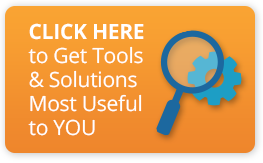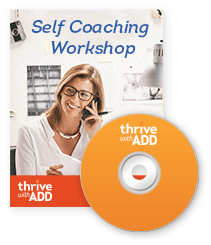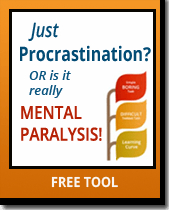
Are you sabotaging yourself because you're ashamed to ask a question?
Many people with ADD / ADHD are afflicted with a toxic shame response that is far more self-sabotaging than simply having ADD. If you’re one of them, and you avoid taking a necessary step to follow through, shame is likely the culprit.
Sometimes taking action isn’t possible because there’s something you need to know first. It might be information, instruction, or guidance on how to start or where to find what you need.
The obvious way to get an answer to any question is to ASK, right?
That’s not so easy if you’re shame-based. One symptom of toxic shame is the fear that asking a question makes you “look stupid.”
Fear of Looking Stupid
When you get stumped by something, do you find yourself thinking things like this?
… “I should know this.”
… “Everyone else knows what to do.”
… “There must be something I’m doing wrong.”
… “I should be able to figure this out on my own.”
Or the worst default of all:
… “If I didn’t have ADHD, I wouldn’t have this problem.”
The underlying assumption for those with ADHD and toxic shame is that everyone else knows something that you don’t. And if you reveal that you don’t know it, you look stupid.
This assumption can pervade just about all aspects of your life. As an ADHD Coach for 18 years, I’ve heard clients express this fear across all age groups, all professions – even from people at high levels of responsibility.
The irony is that this fear of looking stupid usually doesn’t stand up to logic. All it takes is a few questions to make it fall apart.
Here’s a strategy to pull yourself out of shame-based avoidance when you’re afraid of asking a question or admitting there’s something you don’t know.
STRATEGY: “Take It to Court”
Imagine you’re testifying in court on the witness stand. You’re required to answer any questions posed to you with only facts… not assumptions or fears.
Example:
Heather was recently hired as a research analyst for a large, fast-paced financial firm. She was told to research a new biotech company and submit a report in two days. She was given no guidance as to the expected format of the report, how in-depth it was expected to be, or whether background of the industry was required.
Heather knew she needed more direction, but she was afraid that asking would make her look stupid.
She imagined herself on a witness stand, being questioned by an attorney.
Attorney: Why didn’t you ask someone on the team for more direction on this report?
Heather: They always seem so busy and impatient, and I was afraid of looking stupid.
Attorney: Did you get any training on how these type of reports are normally done?
Heather: No, I’m an experienced researcher. I guess they assumed I knew what to do.
Attorney: Have you done any work for this firm before?
Heather: No, this is the first report I’ve been assigned for them.
Attorney: Are you a mind-reader, or do they expect you to be?
Heather: No, I’m not a mind-reader. That wasn’t stated as a job requirement.
Attorney: If you were given no training or guidance, and you can’t read their minds, how would you be able to know what was required without asking someone?
Heather: I guess there’s no way to know.
Attorney: Can we then conclude that your statement about “looking stupid” if you ask for guidance isn’t credible?
Heather must now conclude that her fear of looking stupid has no grounds: it didn’t hold up in court.
The key question in this imaginary exchange is “Are you a mind-reader?” Because usually, when someone is afraid to ask a necessary question, they would have to be able to read minds to know the answer any other way. (And trust me, most non-ADD people aren’t mind-readers either!)
When you ask the right questions with confidence, it makes you look competent… the opposite of stupid.
Coming up next: When an intimidating person makes you feel stupid
Have you held back lately because you were afraid of looking stupid? Would your argument stand up in court?
Please comment and share!





Emelie
My first impulse was not leaving a comment, for fear of sounding stupid, and feeling rejected unless someone immediately replies and validates it… sigh.
It’s sad how deeply this post resonates with me, and also a relief to hear that I’m not the only one. The constant hiding and second-guessing makes life exhausting and very lonely.
Thanks Bonnie for shining some light on the emotional roadblocks that come with ADHD.
Bonnie Mincu
Emelie, Thanks so much for commenting. Your comments validated the post even more, and I appreciate it.
Ann
Comment
I remember the comments from my first and second grade teachers if I didn’t ask the “right question”. They asked me if I was stupid. Asking questions in my family was taboo. If you didn’t know an answer already then you were dumb. It’s taken me years to ask questions. Thank God for Google – Google doesn’t judge!
Bonnie Mincu
Good for you in getting over that fear of asking questions. It’s always seemed pretty irrational to me that someone should be considered dumb for asking questions. The most brilliant minds are inquisitive minds. Geniuses ask LOTS of questions!
I think people who judge others for asking questions are insecure that they themselves might not know how to give an intelligent answer!
Janet
Shame swallows me whole it seems, when I need to ask a question for clarification. Often I did not hear, or rather could not absorb the information when provided the first time. And to ask for the data to be said again stops me in my tracks.
Bonnie Mincu
It sounds like auditory processing is harder for you; probably hearing isn’t your best modality for taking in information. (It’s my own worst modality… if I can’t write something down, I’m hopeless!) Of course, this has nothing whatsoever to do with intelligence.
Try the phrase “I’m sorry, I didn’t get all of that. Could you repeat the part about…” That shows you were listening, but you just want some clarification. If you say it with confidence, there’s no way you’ll sound stupid!
Leslie
I learned a lot about myself here! Technology can quickly frustrate me if I don’t know how to do ‘simple’ steps to download and play an audio lesson in my zoom classes. I struggle and repeat actions until I quit! I try and ask how but I don’t always ask the right person and get short shaming answers and still no help.
This lets me know it’s not me, no one knows or can do all. I will find another source of help and breathe deeply.
Thank you Bonnie
Bonnie Mincu
Leslie, technology is frustrating for most people who don’t know the steps to follow… and those “simple” steps are always changing! Imagine all the people — ADHD or not — who had to learn Zoom in a hurry last year, and maybe had to get a new computer because their old one couldn’t handle Zoom calls. I saw this in my family members who were NOT ADHD.
Hint: When it comes to anything with tech, ask Google! If you’re specific of what you want to know, you’ll get “how-to” answers, either with step by step instructions right on the Google page, or with lots of explanatory videos. You may need to tell it what kind of device you have, what year, etc. And always add the current year to your question; you don’t want an answer for software that isn’t current.
When you realize there’s something more you need to get the right answer (for example, your operating system or browser), then open a new Google page and type “how do I find out my operating system” or “what’s a browser?” Google never judges!
Jane S. Rehder
Clearly, I am an adult. I’ve been on ADD meds for about 20 yrs. Got off the Dexo.@Amphet. 10 yrs ago to see if I’d be okay. NO, did something very odd. So, I continue w/ it. Problem a. it slows down my reaction timing@ brain & verbal. If I’m with a group of people in INTERESTING conversation( I’m well read, opinionated ), by the time I have my speaking points, & some strategy.. and ready to jump into the talk — the group is breaking up, topic is done. I’m disappointed w/ myself; I’m then a very quiet person.** Did very well in a college SPEECHes class. Maybe I need to go over my notes from this.
Bonnie Mincu
I’m not sure if you’re saying medication slowed down your reaction/thinking time, or NOT being on medication slowed it down. If you’re style is introverted (tend to think before speaking), maybe you need to practice responding in a conversation without being concerned about having all your talking points and strategy. A conversation is more about give and take, rather than one person talking long and thoughtfully. So maybe just making the one point that comes into your mind as a response would engage you in the conversational flow.
If you make the goal to be more engaged in the conversation rather than being brilliant, you’re more likely to speak comfortably. And without that pressure, you can let go of being disappointed in yourself.
Stephanie
I resonate with this deeply, so deeply I just wanted to cry. Shame has such a hold on my life and the fear of misinterpreting what is being asked of me and making a mistake and being shamed for it. I am working through releasing shame and all my triggers a lot right now. I sometimes wonder if besides the ADHD I have some kind of problem with the way I process information. I often have to read and re-read until I fully understand. Yet when I am in my zone, I do extremely well and I am able to clearly demonstrate or speak to issues when I am teaching. Just wish i could feel less shame more often. Thank you Bonnie, so far all your posts have helped me so much.
Bonnie Mincu
Stephanie, from what you say, it does sound like you have a processing issue (pretty common with ADHD!) But the shame you feel is probably causing you more difficulty and distress than the challenges of ADHD and processing. Please check out my Productivity Pathfinder membership program. We have so many members experiencing what you are, especially regarding shame. But they’re learning solutions for the ADHD-related challenges, so little by little are finding less to be ashamed about. It’s a wonderful, supportive community to be a part of!